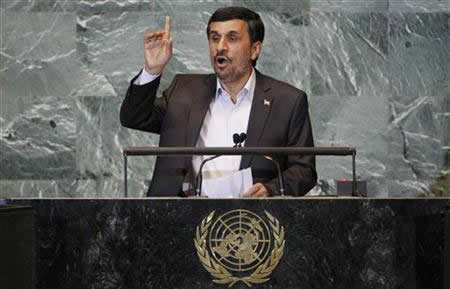Iran’s foiled plot to assassinate the Saudi ambassador in Washington underscores the thuggish nature of Iran’s predatory regime, its willingness to accept high risks to punish its enemies, and its contempt for the United States as well as for international law.

Iran's President Mahmoud Ahmadinejad addresses the 66th United Nations General Assembly at the U.N. headquarters in New York, September 22, 2011. REUTERS/Shannon Stapleton
The plot was apparently hatched by the top officers within the Quds Force of the Islamic Revolutionary Guards Corps. Named after Jerusalem (al-Quds), this elite unit made up of approximately 2,000 personnel plays a leading role in covert operations to advance Iran’s Islamic revolution. The Quds Force combines the roles of special operations military forces and covert intelligence operations.
The Quds Force has a long history of targeting Iranian exiles for assassination and supporting terrorist operations against Iran’s enemies. It recently has been active in Lebanon, Iraq, and Afghanistan, where it has trained, financed, and supported radical Shia groups and other forces open to Iranian support.
The Quds Force is primarily concerned with exporting Iran’s revolution. Iran’s Supreme Leader, Ayatollah Ali Khamenei, personally appoints the head of the Quds Force as well as the head of the Revolutionary Guards, which is a core element of the Iranian state. There should be no doubt that the policies implemented by the Revolutionary Guards are set by Iran’s top leaders.
By brazenly planning to assassinate the Saudi ambassador—an act of war—the Iranian regime has raised uncomfortable questions about whether a nuclear Iran could be contained or deterred. Even if one chooses to interpret the assassination attempt as a rogue operation, as many apologists for Iran are sure to do, it is the Revolutionary Guards that will have their fingers on the nuclear trigger by virtue of their control over Iran’s nuclear weapons and ballistic missile programs.



























